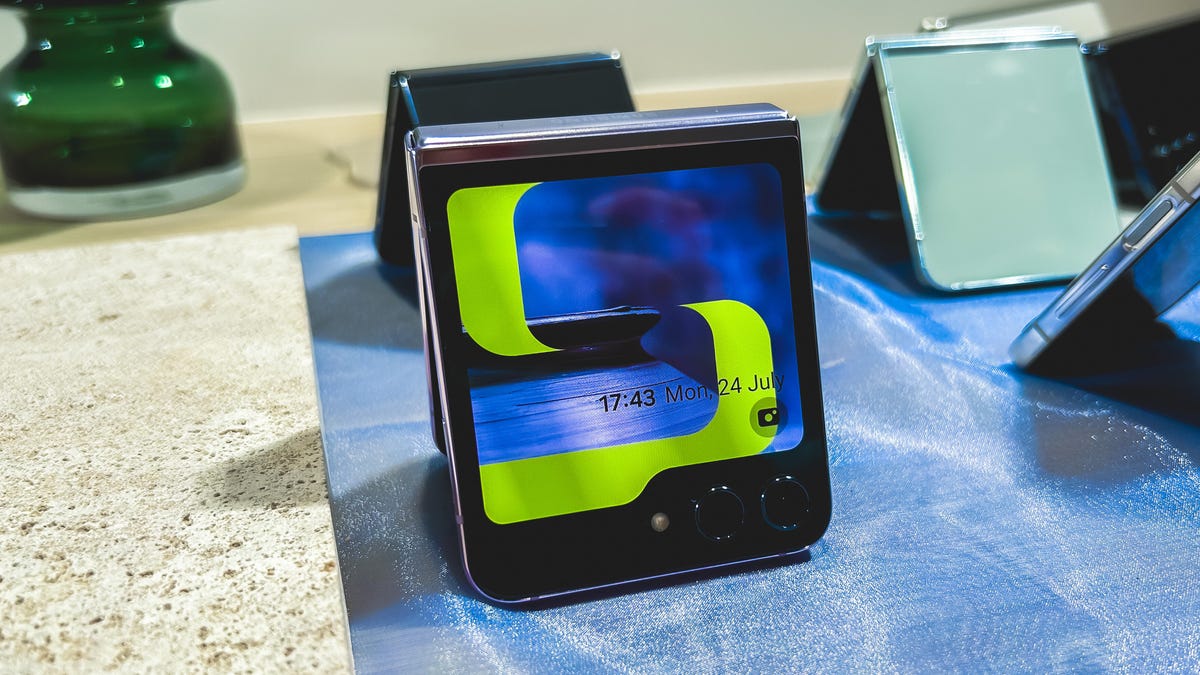Samsung Galaxy Z Flip 5 Hands-On: Bigger Display, More Personal Customizations

Samsung’s new Galaxy Z Flip 5 gains a significantly larger cover screen, an upgraded hinge and a new processor that should improve performance and photography, addressing some of the Galaxy Z Flip 4’s biggest shortcomings. It launches on Aug. 11 starting at $1,000 (£1,049, AU$1,649), showing that consumers still have to pay a high price to get their hands on phones that fold in half.
The Galaxy Z Flip 5’s biggest upgrade is its new cover display, which I found compelling during my brief time using the device. With this upgrade, the external display actually feels functional and useful rather than just cosmetic, helping Samsung’s flip phone catch up to those made by Motorola and Chinese tech giant Oppo.
Samsung introduced the new flip phone at its Galaxy Unpacked event in Seoul on Wednesday, alongside a bevy of other products such as the Galaxy Z Fold 5, Galaxy Watch 6 series and Galaxy Tab S9 family. The launch underscores Samsung’s bet that foldable designs are the future of high-end smartphones, especially as a differentiator to Apple just ahead of iPhone launch season.
The Galaxy Z Flip 5 (left) and Galaxy Z Flip 4 (right).
The Galaxy Z Flip 5’s cover display, which Samsung now calls the Flex Window, measures 3.4 inches compared to the Z Flip 4’s 1.9-inch external display. That makes it just slightly smaller than the 3.6-inch front screen on the Motorola Razr Plus.
Most people will still use the Z Flip 5’s 6.7-inch internal screen for tasks like reading the news, playing games and browsing social media. But the bigger cover display could make the Z Flip more useful in other ways. When I reviewed the Razr Plus, for example, I was enamored with the phone’s spacious cover screen. I loved propping it open like a tent while playing music, and even typing to quickly respond to a text message.
Watch this: Samsung Galaxy Z Flip 5 Hands-On: A Bigger Screen Goes a Long Way
Samsung is attempting to provide a similar experience with the Z Flip 5. During my brief time with it, I scrolled through Google Maps, typed in the messages app and even watched the Barbie movie trailer on YouTube without opening the phone. You can’t do any of that on the Z Flip 4’s cover screen. Although you can on the Razr Plus.
But you won’t be able to use every app on the front display. For the most part, Samsung limits cover screen apps to ones it believes have a good reason to be there, like Google Maps, YouTube and WhatsApp. Samsung wants to focus on use cases that make sense for the cover screen, like quickly checking directions or replying to a text, which is why only about 10 apps will be available on the Flex Window at launch. That differs from the Razr Plus, which can run just about any app (including TikTok) on the front screen.
If you want to try other apps on the cover screen you can install Good Lock, an app for Samsung devices that lets people customize their phones’ interface.
Cover screen apps seamlessly transition to the 6.7-inch internal display when you open the phone. But this doesn’t work the other way around, as it does on the Motorola Razr.
The cover screen feels like it was primarily designed to run widgets more than full apps. These widgets are the first thing you see when turning on the cover screen, and they provide a larger view of the weather, your calendar, alarms, connected device controls and other tidbits of information compared to the Z Flip 4’s minuscule screen. You can remove or reorder these widgets, either on the cover screen or in the phone’s settings menu.
The Z Flip 5 also has a new hinge, which Samsung calls the Flex Hinge. This enables the device to fold completely closed, like the Razr Plus, without the wedge-shaped gap found on previous Galaxy Z Flip and Fold devices.
This not only makes the phone feel more compact, but it should improve durability, according to Samsung. The new hinge has fewer moving parts compared to the previous version, which should make it less susceptible to damage. Both of Samsung’s new foldables have an IPX8 water resistance rating, which should allow them to withstand submersion in 1.5 meters (roughly five feet) of water for up to 30 minutes. That’s the same durability rating as last year’s devices.
The cover screen and hinge are the Galaxy Z Flip 5’s biggest upgrades. Otherwise, the phone gets a routine processor upgrade to the Qualcomm Snapdragon 8 Gen 2 for Galaxy. It’s the same chip that powers the Galaxy S23 lineup, which helped improve the battery life and image processing. I’m looking forward to seeing whether that holds true for the Galaxy Z Flip 5. Samsung is leaning on this chip to shoulder the burden of extending the Z Flip 5’s battery life since it has the same 3,700-mAh battery capacity as the Z Flip 4. The base storage is also increasing from 128GB to 256GB on the Z Flip 5 compared to the Z Flip 4, a change that Samsung also made to the Galaxy S23 Plus earlier this year.
The Galaxy Z Flip 5 with its cover screen.
Cameras have always been an important part of the Galaxy Z Flip series, but the Z Flip 5 has similar camera hardware compared to last year’s model. That includes a 12-megapixel main camera, a 12-megapixel ultrawide camera and a 10-megapixel selfie camera. The difference this year is that the cameras have a new lens coating that should reduce lens flare. Hopefully this, combined with the new processor, will improve the Galaxy Z Flip’s cameras from what my colleague Patrick Holland called “B-grade cameras” in his review last year. And of course, the Z Flip 5’s enlarged cover screen also means you’ll have a roomier viewfinder for taking selfies when the phone is closed.
The Galaxy Z Flip 5’s software experience is largely the same as that of the Z Flip 4, but Samsung added more integrations with its new Galaxy Watch 6. For example, when the camera app is open and you fold the Flip 5 halfway to put it in Flex Mode and you’ll see the icon for the camera controller app pop up on your Galaxy Watch 6’s watch face. This lets you see a preview of what you’re shooting and change angles from your wrist. The app itself isn’t new, but the watch’s ability to surface it when it detects that you’re taking a photo in Flex Mode is.
The Galaxy Z Flip 5 feels like Samsung’s attempt to address the previous generation’s biggest compromises: A cover screen that felt too tiny to be useful, a relatively short battery life and a hinge that didn’t fold as flat as some competitors. Whether I’ll recommend this phone depends on how well Samsung executes on that goal.
But most importantly, I hope the cover screen gives the Z Flip 5 a clearer purpose. Having a phone with a built-in tripod that can fit in your pocket more easily is helpful, but it’s not enough to convince most people to switch to a $1,000 flip phone for. The Razr Plus’ larger external display proved that flip phones can be about more than just portability. With the Z Flip 5, I’ll be expecting Samsung to push that idea further.
Samsung Galaxy Z Flip 5 specs vs. Motorola Razr Plus, Samsung Galaxy Z Flip 4, Motorola Razr 2023
| Samsung Galaxy Z Flip 5 | Motorola Razr Plus | Samsung Galaxy Z Flip 4 5G | Motorola Razr 2023 | |
| Display size, tech, resolution, refresh rate, brightness | Cover: 3.4-inch AMOLED (728 x 720 pixels); internal: 6.7-inch AMOLED (2,640 x 1,080 pixels), 1-120Hz | Cover: 3.6-inch OLED (1,066 x 1,056 pixels); internal: 6.9-inch (2,640 pixels x 1,080) | Cover: 1.9-inch AMOLED (512 x 260 pixels); internal: 6.7-inch (2,640 x 1,080 pixels) | Cover: 1.5-inch, OLED (194 x 368 pixels); internal: 6.9-inch (2,640 pixels x 1,080) |
| Pixel density | Cover: 306 ppi, Internal: 425 ppi | Cover: 413 ppi, internal: 413ppi | Cover: 302 ppi, internal: 425 ppi | Cover: 282 ppi, internal: 413 ppi |
| Dimensions (inches) | Open: 6.5 x 2.83 x 0.27 in; closed: 3.35 x 2.83 x 0.59 in | Open: 2.91 x 6.73 x 0.28 in; closed: 2.91 x 3.48 x 0.59 in | Open: 2.83 x 3.3 x 0.67 in; closed: 2.83 x 6.5 x 0.27 in; hinge: 0.59 in (sagging) | Open: 2.91 x 6.73 x 0.29 in; closed: 2.91 x 3.47 x 0.62 in |
| Dimensions (millimeters) | Open: 71.88 x 165.1 x 6.89 mm; closed: 71.88 x 85.09 x 14.99 mm | Open: 73.95 x 170.83 x 6.99 mm; closed: 73.95 x 88.42 x 15.1 mm | Open: 71.9 x 165.2 x 6.9 mm; closed: 71.9 x 84.9 x 17.1 mm; hinge: 15.9 mm (sagging); | Open: 73.95 x 170.82 x 7.35 mm; closed: 73.95 x 88.24 x 15.8 mm |
| Weight (grams, ounces) | 187 g (6.6 oz) | 189 g (6.64 oz) | 187 g (6.59 oz) | 189 g (6.65 oz) |
| Mobile software | Android 13 | Android 13 | Android 12/13 | Android 13 |
| Camera | 12-megapixel (main), 12-megapixel (ultrawide) | 12-megapixel (main), 13-megapixel (ultrawide) | 12-megapixel (main), 12-megapixel (ultrawide) | 64-megapixel (main), 13-megapixel (ultrawide) |
| Front-facing camera | 10-megapixel | 32-megapixel | 10-megapixel | 32-megapixel |
| Video capture | TBD | 4K | 4K | 4K |
| Processor | Snapdragon 8 Gen 2 | Snapdragon 8 Gen 1 | Snapdragon 8 Plus Gen 1 | Snapdragon 7 Gen 1 |
| RAM/storage | 8GB + 256GB/512GB | 8GB + 256GB | 8GB+ 128GB/256GB/512GB | 8GB + 128GB |
| Expandable storage | None | None | None | None |
| Battery | 3,700 mAh (dual-battery) | 3,800 mAh | 3,700 mAh | 4,200 mAh |
| Fingerprint sensor | Side | Side | Side | Side |
| Connector | USB-C | USB-C | USB-C | USB-C |
| Headphone jack | None | None | None | None |
| Special features | 5G-enabled, IPX8 water resistance, 25W wired charging, wireless charging, wireless power share, dual SIM | IP52, 5G-enabled, foldable display, 30W wired charging, wireless charging | IPX8, 5G enabled, foldable display, wireless charging, 25W fast charging | IP52, 5G-enabled, foldable display, 30W wired charging, 5W wireless charging |
| US price off-contract | $1,000 | $1,000 | $999 | TBA |
| UK price | £1,049 | Converts to £780 | £999 | TBA |
| Australia price | AU$1,649 | Converts to AU$1,475 | AU$1,499 | TBA |
Source: CNET














